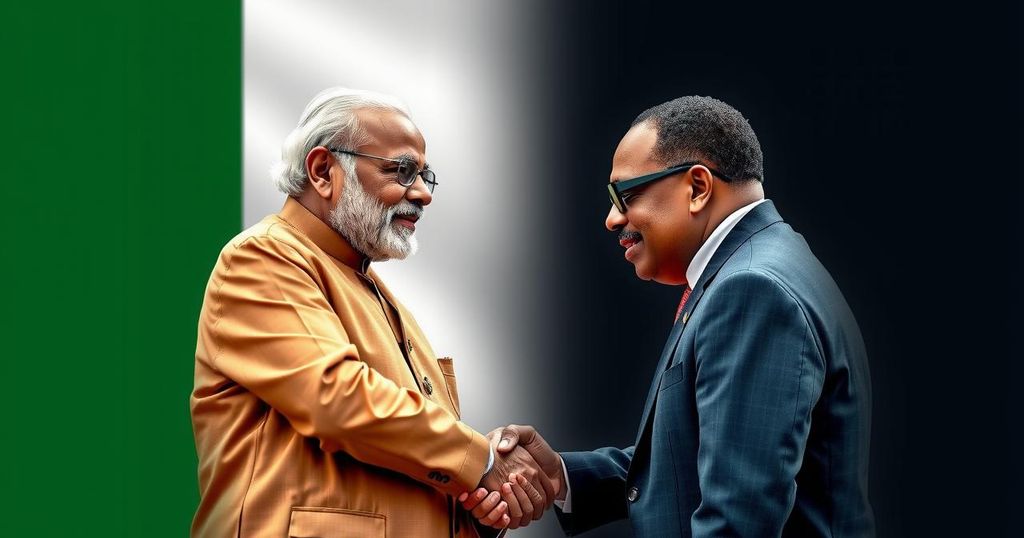India Prioritizes Strategic Partnership with Nigeria: PM Modi
Prime Minister Narendra Modi emphasized India’s strategic partnership with Nigeria during his visit to Abuja, the first in 17 years. He discussed enhancing cooperation in defense, trade, energy, and agriculture with President Bola Ahmed Tinubu, reaffirming their commitment to combat terrorism and piracy. The leaders signed three MoUs and recognized the Indian expatriate community’s significance. Modi’s visit is part of a three-nation tour and aims to strengthen ties between both countries while addressing global challenges.
Prime Minister Narendra Modi emphasized the importance of India’s strategic partnership with Nigeria during his recent visit to Abuja, which marked the first such trip by an Indian leader in 17 years. His discussions with Nigerian President Bola Ahmed Tinubu focused on strengthening bilateral relations in crucial areas such as defence, trade, energy, and agriculture. Moreover, the leaders pledged to collaborate in combating terrorism, piracy, and radicalization, thereby reinforcing their commitment to the aspirations of the Global South. During the meeting, Modi proposed leveraging India’s expertise in various sectors including agriculture, renewable energy, and digital transformation to bolster Nigeria’s capabilities. President Tinubu expressed gratitude for India’s development assistance, which has significantly contributed to building local skills and capacities. The visit commenced with a ceremonial welcome for Modi, followed by a productive one-on-one meeting with Tinubu and subsequent delegation-level discussions. In a post shared on social media platform X, Modi characterized the dialogues as “very productive” and noted the vast potential for further collaboration in multiple sectors. Following these discussions, the two nations signed three Memoranda of Understanding related to cultural exchange and customs cooperation. Modi highlighted significant challenges such as terrorism and drug trafficking that require joint measures by both nations. He expressed confidence that their discussions would initiate a new phase in India-Nigeria relations and acknowledged the approximately 60,000 strong Indian expatriate community in Nigeria, affirming their vital role in the partnership. The Ministry of External Affairs (MEA) noted that Modi and Tinubu reviewed the progress of existing cooperation while identifying opportunities for expanding partnership in trade, investment, education, energy, health, culture, and people-to-people connections. Discussions also covered enhancing defense cooperation, with both leaders reiterating their commitment against shared threats. During a media briefing, Dammu Ravi of the MEA pointed out the leaders’ consensus on advancing bilateral economic collaboration, particularly in renewable energy. He underscored that both countries are well-positioned to promote the aspirations of the Global South. They also deliberated on global and regional matters while acknowledging the efforts of India to elevate concerns of developing countries through the Voice of the Global South summits. Modi conveyed condolences to Tinubu for the recent floods in Nigeria and recognized the Nigerian President’s contributions to regional organizations such as ECOWAS. He also invited Nigeria to join India’s green initiatives, referring to its participation in international agreements focused on sustainability. Modi noted the significance of the African Union becoming a permanent member of the G20, emphasizing mutual interests. Following bilateral discussions, President Tinubu hosted a state banquet for Modi. This visit is part of Modi’s larger three-nation tour, with subsequent destinations including Brazil and Guyana. It is noteworthy that the formal status of the India-Nigeria relationship as a ‘strategic partnership’ was established during Prime Minister Manmohan Singh’s visit in 2007, highlighting a long-standing collaboration that has persisted for over six decades.
The strategic partnership between India and Nigeria has historical roots dating back to Nigeria’s independence in 1960. India has played a significant role as a development partner, evidenced by substantial investments across various sectors and the establishment of diplomatic relations. India’s commitment has been reflected in both financial assistance and capacity-building initiatives, including training programs aimed at enhancing local expertise. This partnership is further bolstered by a large Indian expatriate community residing in Nigeria, which serves as a vital link in diplomatic and economic ties.
In conclusion, Prime Minister Modi’s visit to Nigeria signifies a renewed commitment to strengthening bilateral ties through cooperation in key sectors. The discussions highlighting joint efforts against shared global challenges such as terrorism underline the strategic depth in their partnership. With signed agreements and a shared vision for the future, both nations are poised to expand collaboration, particularly within the frameworks of the Global South, promoting sustainable development and mutual growth.
Original Source: www.business-standard.com




Post Comment